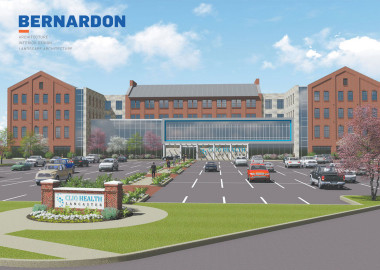Here’s how Aspire Ventures wants to transform health care with Clio Health Lancaster

After years of talking about transforming health care, Lancaster-based Aspire Ventures is ready to start showing people what that means. The venture capital firm recently gave LNP a demonstration of its high-tech vision, which will debut across the county next spring.
It starts with a Carepoint, which looks like a fancy shower stall, and it goes like this:
You use an app to unlock it and step in fully clothed, and within minutes its systems have touchlessly checked your vital signs and guided you through motions that let it assess the cause of any musculoskeletal pain you report.
Then it recommends follow-up care, displays options for that care, estimates how much each option would cost, and lets you schedule an appointment with the provider you choose.
The Carepoint visit is provided to you free under your participating medical insurance plan.
Your employer may offer you a premium reduction to get you to use it, in lieu of a more traditional annual health assessment process in the workplace.
Aspire leaders say Carepoint and related innovations will make it easier for patients to access health care, and free providers from routine data gathering and data entry tasks.
“All the administrative pieces of the visit, we want to make those as efficient as possible and pack it into a really simple patient experience that starts at the Carepoint,” said Mike Monteiro, Aspire’s chief data science and innovation officer.
Carepoints will make initial access easy for patients, he said, and a health facility under construction will serve as the hub, with doctor’s offices and operating rooms for in-person care.
Dan Mitchell, Aspire’s vice president of business development, said the company’s “really excited about the opportunity for Lancaster to be ground zero for what could be the community health care model of the country.”
The Carepoints are a key part of Aspire’s Clio health plans, which will center on a $45 million “microhospital” dubbed Clio Health Lancaster. It’s being constructed on the northern edge of Lancaster city.
Clio is expected to open sometime next spring, Aspire leaders said.
They expect to have about 20 Carepoints up and running in the Lancaster area by then, at a cost of $20,000 to $100,000 apiece, depending on what each includes.
The locations have yet to be determined.
Aspire leaders said they think self-insured companies will be interested in the Clio concept and that it might make sense to install Carepoints in those workplaces, or in gyms or other highly trafficked areas, as well as at Clio’s doctor offices.
And, they said, they’re already looking at four other communities for potential sites of Clio microhospitals and Carepoints, although they’re not ready to name them yet.
Many parts
Aspire expects Carepoints scattered throughout the community to integrate a variety of systems, including some it’s developing.
For instance, Aspire is working on low-intensity laser beams that use vibrations within the body to measure vital signs including blood pressure, body temperature and heart rate; those will be a key part of the Carepoints.
The musculoskeletal assessment feature will come from BG Ventures, aka Biogaming, a company in the Aspire incubator whose program recently secured approval from the U.S. Food and Drug Administration.
That program also can guide patients through physical therapy.
Carepoints also will integrate other data from fitness trackers, health insurance plans and electronic health records.
All of it will be protected by encryption and a cognitive security system that, in Monteiro’s words, works at “predicting hacks before they happen and shutting them down automatically.”
Another possibility is presented by Aspire venture Vita Vista, which is working on medical imaging analytics.
Company leaders say these could make skin cancer screenings as easy as stepping into a Carepoint — instead of waiting months for an appointment with a dermatologist.
And Aspire founder and CEO Essam Abadir said more possibilities are likely to arise as the company continues to use its expertise to find and develop innovations that will change health care.
Aspire also has a venture called Tempo Health, which, LNP has previously reported, uses predictive analytics to help patients better regulate their blood sugar.
Tempo is now working on devices, too, Monteiro said, displaying prototypes for a small adhesive patch to replace continuous glucose monitors, and a related insulin pump, which together could form a kind of cloud-based pancreas.
The impact
Aspire leaders say they think the Clio system will go beyond making health care more efficient and user-friendly, toward the perennial health care goals of improving outcomes and reducing costs.
“The level of information we have here combined with predictive analytics can be really powerful for the employer, for the provider, for the insurance carrier, giving them deeper insights into what interventions are actually doing what (and) what compliance is actually like,” Monteiro said.
In addition to about 25 doctors employed directly by Clio, leaders said, they expect the system to work with cooperating practices.
Steel framework is now in place for the Clio building in the Stockyards business park, on the Marshall Avenue site of the former Lancaster Stockyards.
Leaders estimate the building will cost about $34 million and its equipment another $11 million.
Written by Heather Stauffer; Published by lancasteronline.com
< Return to Noteworthy